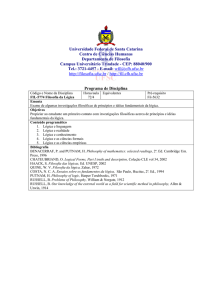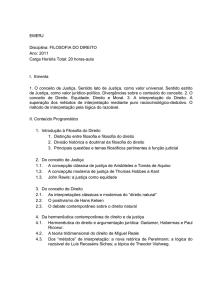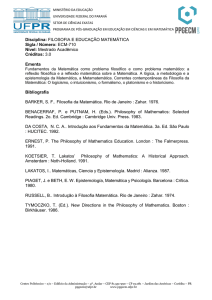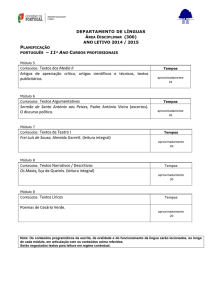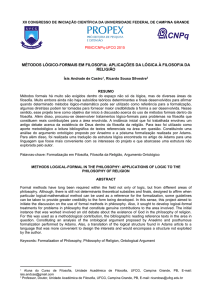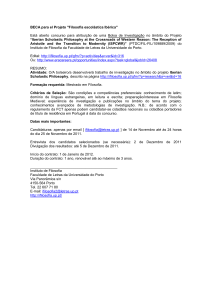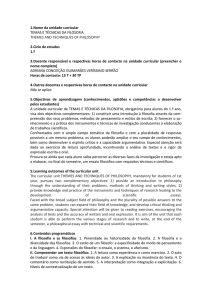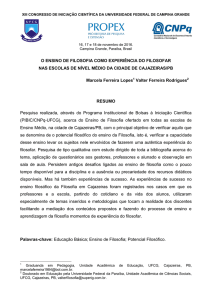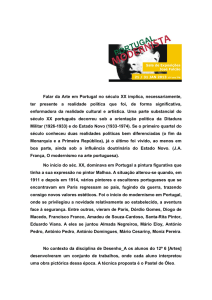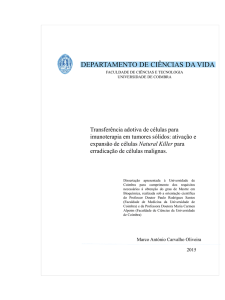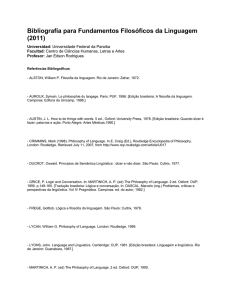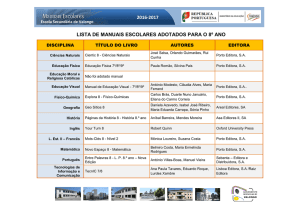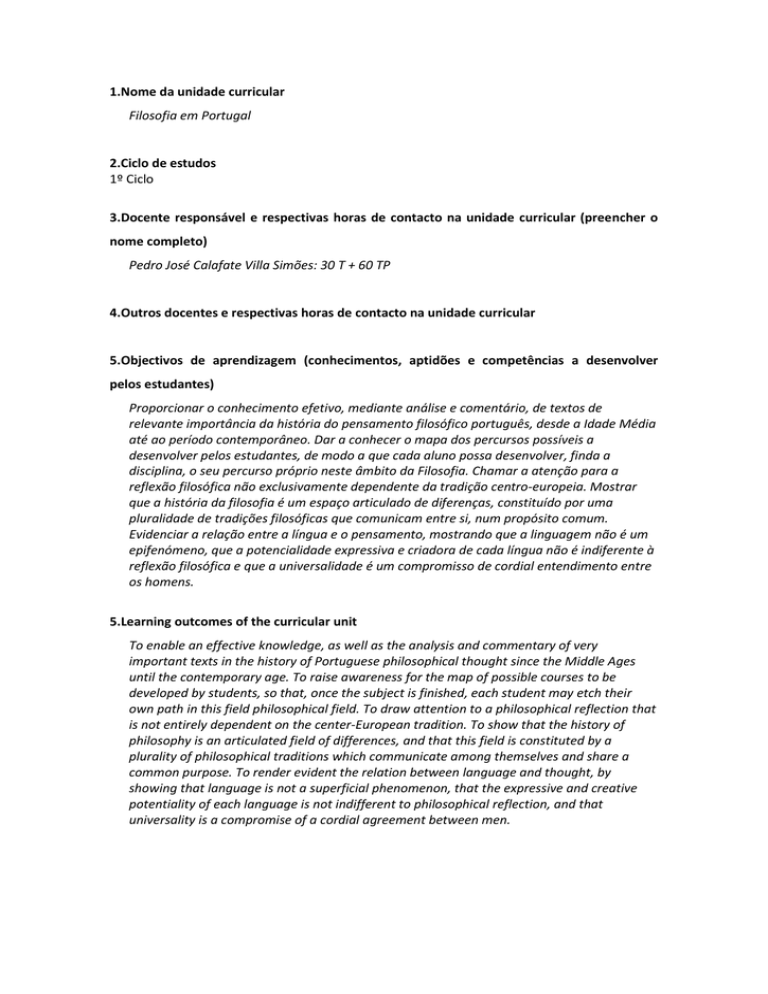
1.Nome da unidade curricular
Filosofia em Portugal
2.Ciclo de estudos
1º Ciclo
3.Docente responsável e respectivas horas de contacto na unidade curricular (preencher o
nome completo)
Pedro José Calafate Villa Simões: 30 T + 60 TP
4.Outros docentes e respectivas horas de contacto na unidade curricular
5.Objectivos de aprendizagem (conhecimentos, aptidões e competências a desenvolver
pelos estudantes)
Proporcionar o conhecimento efetivo, mediante análise e comentário, de textos de
relevante importância da história do pensamento filosófico português, desde a Idade Média
até ao período contemporâneo. Dar a conhecer o mapa dos percursos possíveis a
desenvolver pelos estudantes, de modo a que cada aluno possa desenvolver, finda a
disciplina, o seu percurso próprio neste âmbito da Filosofia. Chamar a atenção para a
reflexão filosófica não exclusivamente dependente da tradição centro-europeia. Mostrar
que a história da filosofia é um espaço articulado de diferenças, constituído por uma
pluralidade de tradições filosóficas que comunicam entre si, num propósito comum.
Evidenciar a relação entre a língua e o pensamento, mostrando que a linguagem não é um
epifenómeno, que a potencialidade expressiva e criadora de cada língua não é indiferente à
reflexão filosófica e que a universalidade é um compromisso de cordial entendimento entre
os homens.
5.Learning outcomes of the curricular unit
To enable an effective knowledge, as well as the analysis and commentary of very
important texts in the history of Portuguese philosophical thought since the Middle Ages
until the contemporary age. To raise awareness for the map of possible courses to be
developed by students, so that, once the subject is finished, each student may etch their
own path in this field philosophical field. To draw attention to a philosophical reflection that
is not entirely dependent on the center-European tradition. To show that the history of
philosophy is an articulated field of differences, and that this field is constituted by a
plurality of philosophical traditions which communicate among themselves and share a
common purpose. To render evident the relation between language and thought, by
showing that language is not a superficial phenomenon, that the expressive and creative
potentiality of each language is not indifferent to philosophical reflection, and that
universality is a compromise of a cordial agreement between men.
6.Conteúdos programáticos
Introdução: Língua e Cultura; o problema das filosofias nacionais
I-
Idade Média
Filosofia da história em Orósio de Braga; ética em Martinho de Dume; ética e filosofia política
em Álvaro Pais; ética e filosofia política na geração de Avis: o infante D. Pedro e D. Duarte;
tema da saudade em D. Duarte e seus desenvolvimentos posteriores na modernidade: Luís de
Camões, Duarte Nunes de Leão, D. Francisco Manuel de Melo; fundamentação ética das
relações económicas em João Sobrinho;
II- Renascimento
Teoria do conhecimento em Francisco Sanches; estética e teoria da arte em Francisco de
Holanda; o modelo do humanismo católico em Jerónimo Osório; a filosofia do amor em Leão
Hebreu; fundamentação dos direitos da pessoa humana: a Escola Ibérica da Paz (Francisco
Suárez, Luís de Molina, Fernando Pérez; Pedro Simões, António de São Domingos).
III- Barroco
O pensamento e a obra do Padre António Vieira; fundamentação ética e jurídica da
Restauração (Francisco Velasco de Gouveia, João Pinto Ribeiro, António Carvalho de Parada,
Manuel Fernandes de Vila Real).
IV- O Iluminismo
Filosofia da história; filosofia política; ética; filosofia da educação; filosofia do conhecimento;
ciência e religião (D. Luís da Cunha; Luís António Verney; José Seabra da Silva; Manuel do
Cenáculo; Teodoro de Almeida, Estatutos da Universidade de Coimbra; Compêndio Histórico
da Universidade de Coimbra; António Nunes Ribeiro Sanches); A reflexão sobre a vaidade dos
homens em Matias Aires.
V- Século XIX
A reflexão sobre Portugal no contexto dos desafios europeus: Almeida Garrett; Alexandre
Herculano; João de Andrade Corvo; Antero de Quental; Oliveira Martins; Eça de Queirós;
Guerra Junqueiro; Teófilo Braga; o debate entre cientismo e metafísica em Antero de Quental
e Oliveira Martins; a metafísica da redenção em Sampaio Bruno; o monismo evolucionista de
Guerra Junqueiro.
VI- Século XX
Saudosismo metafísico em Teixeira de Pascoaes; filosofia existencial em Raul Brandão;
racionalismo idealista em António Sérgio; a reflexão sobre Portugal em Fernando Pessoa; a
reflexão sobre Portugal em Raul Proença; criacionismo e filosofia da educação em Leonardo
Coimbra; Portugal sob o signo do Estado Novo; filosofia e literatura em Vergílio Ferreira.
6.Syllabus
Introduction: Language and Culture; the problem of national philosophies
I-
Middle Ages
Philosophy of history in Orósio de Braga; ethics in Martinho de Dume; ethics and political
philosophy in Álvaro Pais; ethics and political philosophy in the generation of Avis: the infant D.
Pedro and D. Duarte; the theme of longing in D. Duarte and its later developments in
modernity: Luís de Camões, Duarte Nunes de Leão, D. Francisco Manuel de Melo; ethical
grounds for economic relations in João Sobrinho;
II- Renaissance
Theory of knowledge in Francisco Sanches; aesthetics and theory of art in Francisco de
Holanda; the model of catholic humanism in Jerónimo Osório; the philosophy of love in Leão
Hebreu; grounds for the rights of the human person: the Iberian School of Peace (Francisco
Suárez, Luís de Molina, Fernando Pérez; Pedro Simões, António de São Domingos).
III- Baroque
The thought and work of Padre António Vieira; ethical and juridical grounds for the Restoration
(Francisco Velasco de Gouveia, João Pinto Ribeiro, António Carvalho de Parada, Manuel
Fernandes de Vila Real).
IV-
The Enlightenment
Philosophy of history; political philosophy; ethics; philosophy of education; philosophy of
knowledge; science and religion (D. Luís da Cunha; Luís António Verney; José Seabra da Silva;
Manuel do Cenáculo; Teodoro de Almeida, Statutes of the University of Coimbra; Historical
Compendium of the University of Coimbra; António Nunes Ribeiro Sanches); reflection on the
vanity of men in Matias Aires.
V-
19th century
Reflection on Portugal in the context of European challenges: Almeida Garrett; Alexandre
Herculano; João de Andrade Corvo; Antero de Quental; Oliveira Martins; Eça de Queirós;
Guerra Junqueiro; Teófilo Braga; the debate between scientism and metaphysics in Antero de
Quental and Oliveira Martins; the metaphysics of redemption in Sampaio Bruno; the
evolutionist monism of Guerra Junqueiro.
VI-
20th century
Metaphysical longing in Teixeira de Pascoaes; existential philosophy in Raul Brandão; idealist
rationalism in António Sérgio; the reflection on Portugal in Fernando Pessoa; the reflection on
Portugal in Raul Proença; creationism and philosophy of education in Leonardo Coimbra;
Portugal under the aegis of the Estado Novo; philosophy and literature in Vergílio Ferreira.
7.Demonstração da coerência dos conteúdos programáticos com os objectivos de
aprendizagem da unidade curricular
Tratando-se de uma disciplina inserida no âmbito temático da História da Filosofia, o programa
apresentado foca os temas que se me afiguram mais relevantes e exequíveis no âmbito da
licenciatura, deixando, no entanto, de fora alguns temas que pela sua complexidade se me
afiguram mais apropriados a estudo pós-graduado, como sejam a Lógica em Pedro Hispano, o
Curso Filosófico Conimbricense, bem como as manifestações posteriores a 1950.
Naturalmente, os temas focados resultam já de uma seleção prévia de critério valorativo,
tendo também em vista a respetiva exequibilidade em termos de tempos letivos.
7.Demonstration of the syllabus coherence with the curricular unit's objectives
Since this subject is within the scope of the History of Philosophy, this program focuses on the
themes that seem to be the most relevant and feasible in the perspective of the undergraduation course, while excluding other themes which, due to its complexity, seem to be
more fit for a post-graduation course, as are the themes of Logics in Pedro Hispano, Coimbra’s
Philosophical Course (Curso Filosófico Conimbricense), as well as other manifestations
subsequent to 1950. Quite naturally, the themes herein approached are in themselves the
result of a previous selection of value criteria, which also aims at the respective feasibility in
terms of school periods.
8.Metodologias de ensino (avaliação incluída)
O teste presencial e escrito, cuja realização exigimos, integra-se numa perspetiva horizontal,
ajustando-se com a necessidade de apreensão da génese temporal das questões filosóficas e
sua evolução. O trabalho escrito, sob a forma de breve ensaio (7 a 15 páginas), insere-se numa
perspetiva vertical, ajustando-se com um primeiro nível de aprofundamento individual que
forneça aos alunos o gosto pela investigação, primeira condição para a abertura de
possibilidades para a construção de um percurso individual. Os trabalhos são sempre
discutidos individualmente com o docente, a fim de reforçar a componente de expressão oral.
8.Teaching methodologies (including evaluation)
The on-site written exam, the realization of which is compulsory, is integrated in an horizontal
perspective, suiting to the need to apprehend the temporal genesis of philosophical questions
and their evolution. The written assignment, under the form of a brief essay (7 to 15 pages), is
integrated in a vertical perspective, thus suiting to a first level of individual insight which
endows the students with a taste for investigation, this being the first condition for a possible
construction of an individual path. Assignments are always discussed individually with the
teacher, so as to reinforce the component of oral expression.
9.Demonstração da coerência das metodologias de ensino com os objectivos de
aprendizagem da unidade curricular
Tratando-se de uma disciplina filosófica, privilegiamos o comentário de texto dos autores em
análise, cientes de que comentar é “pensar com” o autor de um texto a partir do contexto que
a história do pensamento entretanto elaborou. Dado que nos integramos numa Faculdade e
num Departamento com elevado nível de iniciativas em termos de colóquios, congressos e
conferencias internacionais, potenciados também pelo Centro de Filosofia da Universidade de
Lisboa, estimulamos a presença e participação dos alunos, admitindo a respetiva creditação.
Assim, enquanto o teste presencial e escrito, cuja realização exigimos, se integra numa
perspetiva horizontal, o trabalho escrito, sob a forma de breve ensaio (7 a 15 páginas), inserese numa perspetiva vertical, combinando, deste modo, a necessidade de apreensão da génese
temporal das questões filosóficas e sua evolução com um primeiro nível de aprofundamento
individual que forneça aos alunos o gosto pela investigação, primeira condição para a abertura
de possibilidades para a construção de um percurso individual. Os trabalhos são sempre
discutidos individualmente com o docente, a fim de reforçar a componente de expressão oral.
Dada a natureza semestral da disciplina, não incluímos, nos tempos letivos, apresentação oral
de trabalhos.
9.Demonstration of the coherence between the teaching methodologies and the learning
outcomes
Since this is a philosophical subject, we privilege the commentary of the texts by the
aforementioned authors, in full awareness that commenting means “to think with” the author
of a text while bearing in mind the context that the history of thought has in the meantime
forged. Because we are integrated in a Faculty and a Department with such high standard
events in terms of colloquia, congresses and international conferences, also potentiated by the
Centre of Philosophy of the University of Lisbon, we encourage the attendance and
participation of students, granting the respective accreditation. Hence, while the on-site
written exam, the realization of which is compulsory, is integrated in an horizontal perspective,
the written assignment, under the form of a brief essay (7 to 15 pages), is integrated in a
vertical perspective, thus combining the need to apprehend the temporal genesis of
philosophical questions and their evolution with a first level of individual insight which endows
the students with a taste for investigation, this being the first condition for a possible
construction of an individual path. Assignments are always discussed individually with the
teacher, so as to reinforce the component of oral expression. Given the semi-annual nature of
the subject, we do not include any oral presentations during school periods.
10.Bibliografia
Pedro Calafate (dir.), História do Pensamento Filosófico Português, vols. I, II, III, IV, V, Editoral
Caminho Lisboa, 1999-2004 (contém ampla bibliografia)
Pedro Calafate, Portugal como Problema, vols. I, II, III, IV, ed. FLAD-Público, Lisboa, 2006
(contém ampla bibliografia)
Pedro Calafate, Metamorfoses da Palavra Estudos sobre o Pensamento Português e Brasileiro,
IN-CM, 1998 (contém ampla bibliografia)
Pedro Calafate, A ideia de natureza no século XVIII em Portugal, Imprensa-Nacional-Casa da
Moeda, Lisboa, 1994 (contém ampla bibliografia)
Renato Epifânio (org), Bibliografia Filosófica Portuguesa, CFUL, Lisboa, 2006

